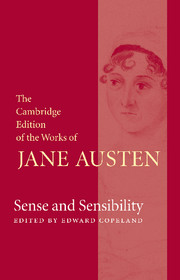Book contents
- Frontmatter
- Contents
- General Editor’s Preface
- Acknowledgements
- Chronology
- Introduction
- Note on the text
- Miscellaneous Frontmatter
- Sense and Sensibility: Volume I
- Sense and Sensibility: Volume II
- Sense and Sensibility: Volume III
- Corrections and Emendations to 1813 Text
- List of Abbreviations
- Explanatory Notes
Chapter 14
Published online by Cambridge University Press: 19 December 2020
- Frontmatter
- Contents
- General Editor’s Preface
- Acknowledgements
- Chronology
- Introduction
- Note on the text
- Miscellaneous Frontmatter
- Sense and Sensibility: Volume I
- Sense and Sensibility: Volume II
- Sense and Sensibility: Volume III
- Corrections and Emendations to 1813 Text
- List of Abbreviations
- Explanatory Notes
Summary
WITHIN a few days after this meeting, the newspapers announced to the world, that the Lady of Thomas Palmer, Esq. was safely delivered of a son and heir; a very interesting and satisfactory paragraph, at least to all those intimate connections who knew it before.
This event, highly important to Mrs. Jennings's happiness, produced a temporary alteration in the disposal of her time, and influenced, in a like degree, the engagements of her young friends; for as she wished to be as much as possible with Charlotte, she went thither every morning as soon as she was dressed and did not return till late in the evening; and the Miss Dashwoods, at the particular request of the Middletons, spent the whole of every day in Conduit-street. For their own comfort, they would much rather have remained, at least all the morning, in Mrs. Jennings's house; but it was not a thing to be urged against the wishes of everybody. Their hours were therefore made over to Lady Middleton and the two Miss Steeles, by whom their company was in fact as little valued, as it was professedly sought.
They had toomuch sense to be desirable companions to the former; and by the latter they were considered with a jealous eye, as intruding on their ground, and sharing the kindness which they wanted to monopolize. Though nothing could be more polite than Lady Middleton's behaviour to Elinor and Marianne, she did not really like them at all. Because they neither flattered herself nor her children, she could not believe them good-natured; and because they were fond of reading, she fancied them satirical: perhaps without exactly knowing what it was to be satirical; but that did not signify. It was censure in common use, and easily given.
Their presence was a restraint both on her and on Lucy. It checked the idleness of one, and the business of the other. Lady Middleton was ashamed of doing nothing before them, and the flattery which Lucy was proud to think of and administer at other times, she feared they would despise her for offering.
- Type
- Chapter
- Information
- Sense and Sensibility , pp. 279 - 288Publisher: Cambridge University PressPrint publication year: 2006

